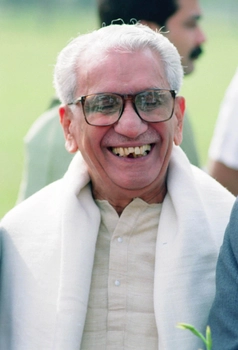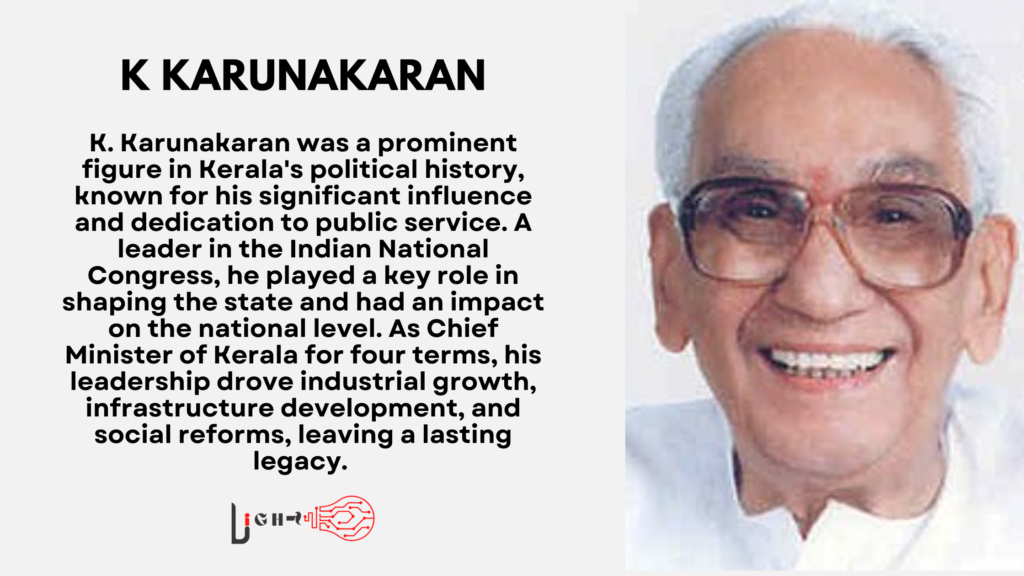K. Karunakaran is a name that stands out in Kerala’s political history. Known for his towering influence and unwavering commitment to public service, he was a key figure in shaping modern Kerala. He rose through the ranks of the Indian National Congress, where he made a lasting impact, not only on the state but also on the national stage. His leadership was instrumental in transforming Kerala, setting the foundation for industrial growth, infrastructure development, and social reforms.
Through four terms as the Chief Minister of Kerala, Karunakaran brought about changes that left a lasting impression. This article delves into his political career, contributions, and the controversies that surrounded him, providing an insightful look at his life and legacy.
Early Life and Political Beginnings
Born on July 5, 1918, in Kannur, Kerala, K. Karunakaran’s entry into politics came early.
Starting as a trade union leader, he demonstrated an affinity for addressing the issues of the common man. His early involvement in the Indian independence movement shaped his future path, where he committed himself to the country’s development post-independence.
As a member of the Indian National Congress, his political career quickly ascended.
He was elected to the Kerala Legislative Assembly in 1965, marking the beginning of a long and storied journey.His efforts soon made him a prominent figure within the party, where he was known for his administrative acumen and strategic thinking.
Karunakaran’s early political experiences laid the groundwork for his future as a leader who would significantly influence Kerala’s growth.
Role in the Indian National Congress
Karunakaran played a crucial role in the Indian National Congress, especially in Kerala.
He was instrumental in consolidating the party’s position during times of political instability.
His ability to navigate complex political situations earned him respect and recognition within the party’s national leadership.
His tenure as the Home Minister of Kerala during the Emergency period (1975-77) solidified his reputation as a decisive leader. Following the Emergency, he emerged as one of the strongest leaders in Kerala’s Congress unit, often referred to as the “Leader” for his influential role.

Karunakaran’s contributions to the Congress extended beyond state politics, as he actively participated in national decision-making processes. His leadership style emphasized organizational strength, which helped the party maintain its foothold in the state.
Contributions to Kerala’s Development
Under Karunakaran’s leadership, Kerala saw a wave of development initiatives.
He prioritized infrastructure projects such as the Cochin International Airport, which became the first airport in India built under a public-private partnership. This was a significant move that set a precedent for future infrastructure projects in the country.
Industrial growth also took center stage, with efforts to boost sectors like tourism, agriculture, and manufacturing. He introduced policies aimed at creating job opportunities, thereby addressing Kerala’s unemployment issues. Karunakaran’s government also focused on healthcare and education, improving access to these essential services for the state’s residents.
His vision for Kerala was not just limited to economic development but also included social welfare programs that improved the quality of life for many.
Controversies and Political Challenges
Despite his achievements, K. Karunakaran’s career was not without controversies.
The most notable was the Rajan case during the Emergency period, where the custodial death of a student brought widespread criticism. This incident cast a shadow over his political image and was a topic of contention throughout his career.
Intra-party conflicts within the Congress also posed challenges.
Karunakaran often found himself at odds with rival factions, leading to periods of political turbulence. His handling of political crises and his strategic maneuvering were frequently tested as he worked to maintain his leadership.
These challenges, while significant, did not overshadow his broader contributions to Kerala’s progress, as he continued to play a prominent role in state politics.
Malala Yousafzai: The Unstoppable Force for Girls’ Education
To know more click here:https://light.vintbit.com/general-knowledge/malala-yousafzai-women-education/
Legacy of K. Karunakaran
K. Karunakaran’s legacy is a mixed one, marked by both achievements and controversies.
He is remembered as a leader who contributed significantly to Kerala’s infrastructure and industrial development. Many credit him with laying the groundwork for the state’s growth trajectory, which continues to benefit from the policies he introduced.
His political career spanned over five decades, during which he left an indelible mark on Kerala’s Congress politics. Even after his tenure, his influence persisted through his supporters and the next generation of leaders who followed his footsteps.
Though some of his decisions were divisive, his overall impact on the state’s progress remains a key part of his legacy, making him a notable figure in India’s political history.
Conclusion
K. Karunakaran’s story is one of a leader who played a pivotal role in shaping Kerala’s modern political and developmental landscape. From infrastructure projects to political challenges, his career encapsulated both the aspirations and complexities of Kerala’s journey towards progress.
While his legacy is viewed through different lenses, his contributions to the state’s development remain undeniable.

